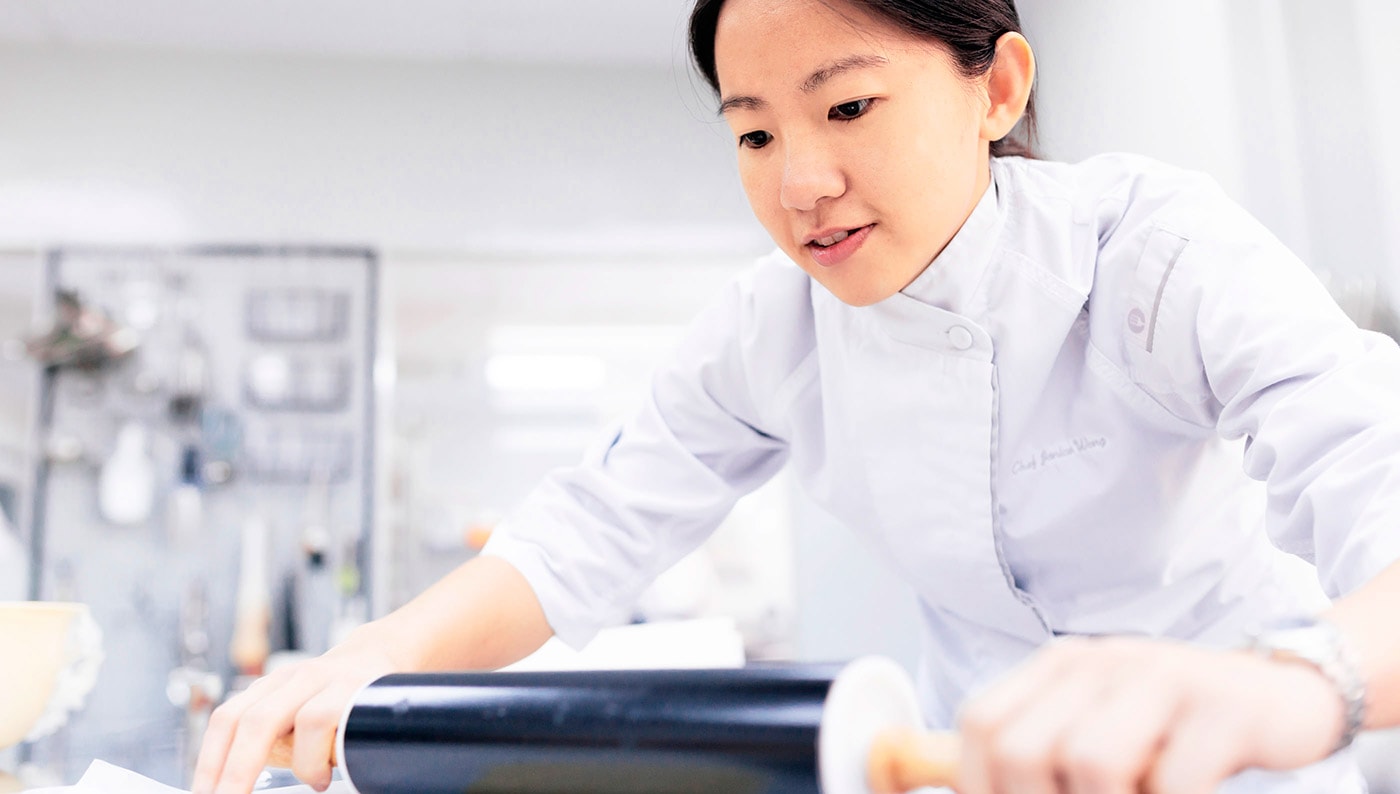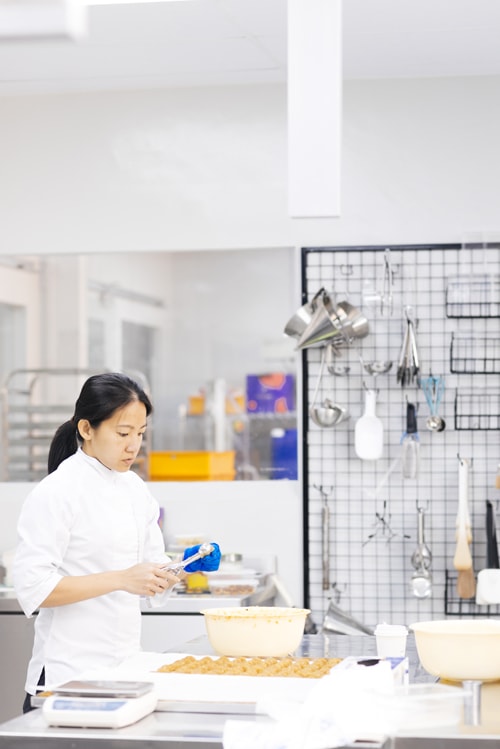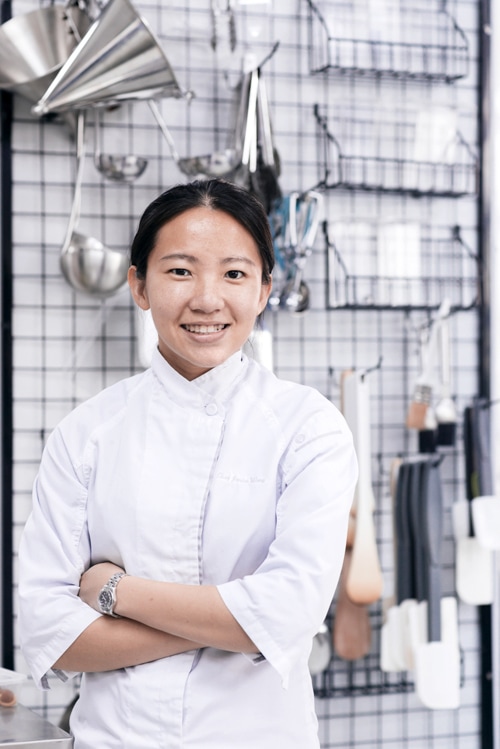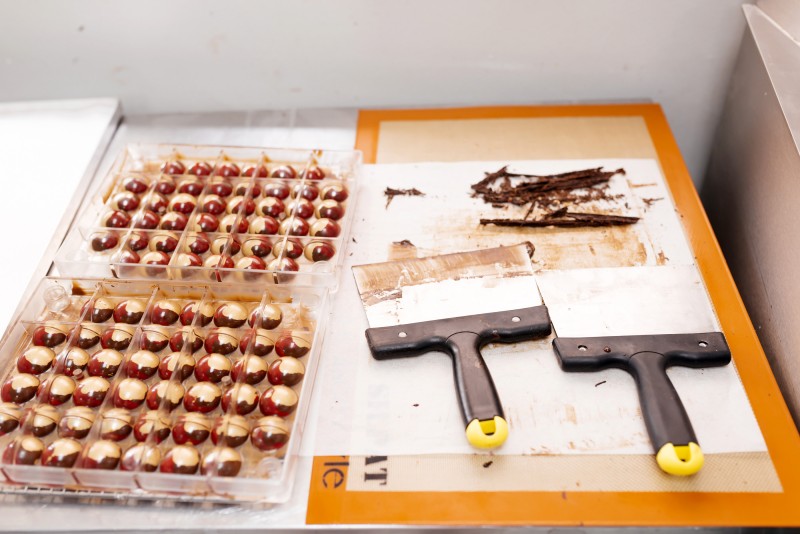Janice Wong: Sweets Master

Janice Wong gives a whole new meaning to the phrase ‘playing with your food’. “It’s the feeling and joy of being free, the freedom of expression, which are very important,” she says. “If I hadn’t grown up playful, the inner child in me would have died.” Indeed, in this playground, she’s Willy Wonka and The Sweets Factory is where she works her magic.
We’re at her meeting room-cum-office. A half-finished piece lies at a corner, while two other pieces hang on the walls. If you’ve seen some of her food art, you’d be as bedazzled as I am: look at this, this, and this – named Purple, Cheese Avalanche, and Sweet Salty Popcorn, respectively. And this too. Exuding a child-like aura, she speaks with light earnestness. In stark contrast to her work, her words are unembellished. Having won Asia’s Best Pastry Chef for the second consecutive year running by the prestigious San Pellegrino Asia’s 50 Best, I ask if all the recognition validates what she set out to do. “It validates the perseverance yes, but you need to remain humble, and continue to learn and grow,” she replies, turning her attention to her stack of bills and emails. I’m Charlie Bucket sans the golden ticket.
YONG HUI YOW: How many staff do you have?
JANICE WONG: More than twenty, most of whom are chefs. We have a lot of service staff too. I’ve actually lost count ever since we expanded, and we are still hiring!
YONG HUI: How do you choose your chefs?
JANICE: We put them on trial for about three days. I look out for chefs who are team players, are positive, have the drive and passion, as well as the sense of responsibility. The qualities I look for are not so much skills as I believe they can be taught.
You can cross a lot of hurdles if you don’t take ‘no’ for an answer.
YONG HUI: So you can turn a non-chef into a chef.
JANICE: Yes, for sure. As long as you have the keenness, the ability, and willingness to learn, you can push a lot of boundaries. You can cross a lot of hurdles if you don’t take ‘no’ for an answer. Everything is possible. It’s about the whole “I’m possible” kind of mentality. I feel that if a person has that, then they’d be very easy to nurture. It’s a mental thing. If you say you cannot do it, then of course, you cannot do it.
YONG HUI: How much of it is talent?
JANICE: 20 per cent. They always say 20 per cent talent, 70 per cent hard work, but then you need that last 10 per cent of luck also.
I want to push the boundaries of how much customisation I can do for each piece, and onto what level, because no one in Singapore does this – not to this level.
YONG HUI: You had a lot of Valentine’s Day orders. Can people order custom-made pieces?
JANICE: Yes absolutely, we did a lot of customisations for Valentine’s Day. Everything was hand-painted. Each piece was a unique concept. I want to push the boundaries of how much customisation I can do for each piece, and onto what level, because no one in Singapore does this – not to this level.
YONG HUI: If I wanted a chocolate sculpture of a guitar. How much would that cost?
JANICE: I have no idea! That is possible, but it depends. Usually, we ask our customers to give us their budget.
YONG HUI: Do people do this for marriage proposals?
JANICE: Not yet. But we do a lot of birthdays, high-end events. We are quite selective about the clientele, and what we can do for them. For one, we don’t accept every job. We don’t want to, because maintaining quality is very important. I think it becomes very easy to say, “Yeah, okay” to every job that comes in, but I cannot manage 2 or 3 at the same time, because that would compromise quality. For us, it is about whether we can deliver. We want to give you the best we can.
YONG HUI: How long does it take to make a sculpture?
JANICE: About 2 or 3 days, depending.
YONG HUI: Why did you turn to making pastry?
JANICE: Well first, I have a sweet tooth. I think that helped. Since I was young, when we [my family and I] went abroad, I had already started to train my palate. From growing up in Hong Kong to Tokyo, I got exposed to very high-quality ingredients, which helped me define my tastes. Those experiences helped me to nurture as a chef. At a certain point, I just decided that this was going to be my life.
YONG HUI: Were there opposition from your parents?
JANICE: Well, they weren’t exactly 100 per cent supportive of me to do this long-term at first. Don’t get me wrong… they’re always supportive, but they thought it would fade. However, after seeing how I did in the first few years, they decided to be extremely supportive. At first, they thought it was just a hobby.
YONG HUI: So you proved them wrong.
JANICE: Yeah, essentially.
YONG HUI: What was your training like when you started out?
JANICE: I went to do a course at Cordon Bleu, and over there, I pushed myself a lot, by going to the cities to intern and work. I worked two jobs in New York at two different restaurants. I really wanted to gain more exposure as I knew my time was limited there. I started out very late as a chef – 21 years old. Other people usually start out at 14 or 16 years old, so I played the catch-up game, trying to get as much exposure as I can.
YONG HUI: How is Japan going?
JANICE: Good!
YONG HUI: Are you getting into manufacturing?
JANICE: Yes, it’s a very big industry there. The opportunities are great, but we want to do this slowly. I’ve opened up my flagship retail store in Singapore at Ion Orchard. We have a whole range of éclairs, chocolates, and cookies – 75 products in all. Everything to do with confectionaries is there. The focus, for now is retail in Singapore. Also, there was the opportunity of opening up this place [The Sweets Factory].
YONG HUI: Do you want to be as big as Mars Bars?
JANICE: We want to be Ladurée in terms of expanding globally, which we are working towards. We also launched with a confectionery in the US, pastilles, but we stopped that for awhile because of the Singapore flagship store.
YONG HUI: What about supermarkets?
JANICE: I think we are a different category of products. I’d probably be creating recipes for the manufacturers and letting them distribute, instead of doing it ourselves.
YONG HUI: Mum always said not to play with food, why are you playing with yours?
JANICE: My parents played a very big part in who I’m today. They have never stopped me from putting things in my mouth, or playing with my food. I feel that helps in fact, with one’s perception and independence. It’s the feeling and joy of being free, the freedom of expression, which are very important. If I didn’t grow up playful, the inner child in me would have died. Then, I might not have been able to create a whole concept of a modern day Willy Wonka.
YONG HUI: How do you keep the ants and bugs away?
JANICE: Pest control helps a lot, but on top of that, we also spray a fixative over the pieces. We have no ants here. This painting over here [points] was painted at Ion. You can even see that people have tasted it from the finger marks. While they were painting, they were also eating it. It’s the edible experience.
We marry pastry with art and fashion: Art, being the canvas for freedom of expression; and fashion, being the collection.
YONG HUI: What is the most common misconception about pastry?
JANICE: People might not know it, but pastry is a very meticulous activity; we have to literally count everything by the grams. Also, there are many classic, traditional pastries, but not many modern takes on them. For us, we really try to push the boundaries. For example, you might not see the strawberry on the cake because it’s inside. We marry pastry with art and fashion: Art, being the canvas for freedom of expression; and fashion, being the collection.
YONG HUI: When you started out, what was Singaporeans’ perception of 2am:dessertbar?
JANICE: It became very popular quickly – still is. Actually, it was for me, one of the best moments and successes of my life. But it’s very easy to launch a new concept, but to last, is very different. It’s probably the same for magazines and media also.
YONG HUI: Does your family eat your pastries?
JANICE: Yes, they are fans!
YONG HUI: What are their favourites?
JANICE: Mmm… they like my kayas, and chocolates.
YONG HUI: Do you cook at home?
JANICE: No. [laughs] I sleep six hours a day, and I work 18 hours a day. I simply have no time…
YONG HUI: So you experimented with Dim Sum. How different is Dim Sum as compared to western pastries.
JANICE: Dim Sum is all about texture and feeling with your hands. It’s all about the dough. Water PH levels are also different in every city, and this affects the dough greatly. They’re very different.
YONG HUI: Might you want to go into breads?
JANICE: No, not at the moment but we might actually explore that in the future.
YONG HUI: You have won many awards. How does that validate what you set out to do?
JANICE: I think it validates the perseverance, yes, but you need to remain humble, and want to continue to learn and grow. I’m still learning every single day and moment. There’s so much to learn you can never finish. I think that in this lifetime, it’s impossible. This helps in pushing me to want to evolve as a person, as a chef, and as a boss.
YONG HUI: If you weren’t running your own business right now and had to work under another chef, who would that be?
JANICE: That’s interesting. I’ve never really thought about that, but maybe Alinea in Chicago. Or, I would be doing something else altogether. I might be an architect.
YONG HUI: What do you think of cronuts?
JANICE: You know what they say… it’s 10 per cent luck – it really is. I think media helps a lot; TV helps a lot, as well as celebrities picking it up. I know Dominique [Ansel] personally. He is a great chef, and I love his work. He is a dear friend, and he’s done a great job.
YONG HUI: Do you think that marketing plays a huge role in this industry?
JANICE: Yes for sure. If you have a lot of marketing dollars, it can go a long way.
YONG HUI: Is food art frivolous?
JANICE: You can say that to some extent, yes. But you can also say a million and one things about it. Food art has a million characteristics and personalities, because everyone has his or her own definition of food art. It’s subjective.
Perfection is a goal, a dream. It’s not unattainable because it’s about expectations.
YONG HUI: What is perfection?
JANICE: Perfection is a goal, a dream. It’s not unattainable because it’s about expectations. I guess you can say perfection is really more of a goal than anything else. You can attain it if you bring your expectations down. It depends on the individual.
YONG HUI: When then do you know when to stop working on a piece?
JANICE: You never know… it’s never done.
YONG HUI: How do people have food memories?
JANICE: That’s an interesting topic for me. I’ve given a lot of talks about it. As a kid, I developed a huge memory bank of flavours, and it’s very important to be developing that. I didn’t realise it until a few years ago, but that actually makes it easier for me to decipher flavours, and marry them because of my food memories. For example, I may quickly discern that maybe durian goes well with pandan, or with mangosteen and so forth. It’s very interesting. Growing up in different cities, I’ve tasted a lot of things and registered them in my memory bank of flavours.
YONG HUI: What makes a great chef?
JANICE: When you cook with your heart. It’s very cliché to say that, but it’s true. You don’t cook with your recipe book; you’re just following instructions and doing a list of things. A great chef loves his food.
YONG HUI: What is bad dessert?
JANICE: A bad dessert is without emotions, or having a short length of taste, and is unbalanced.
YONG HUI: They say don’t trust a skinny chef.
JANICE: That’s bullocks. I’m not very fat. My team here is very lean in fact. It’s just a fun statement that people make.
After it’s all eaten, and it’s a pile of mess, it’s still art.
YONG HUI: Do you feel that art is being destroyed when people tuck into your work?
JANICE: It’s still reserved as art. After it’s all eaten, and it’s a pile of mess, it’s still art.
YONG HUI: Is great food subjective?
JANICE: Yes, without a doubt. It’s the same for designs and buildings and architecture, and furniture.
YONG HUI: What happens when you receive negative feedback?
JANICE: Everyone receives negative feedback, even in your industry. You just take it with a pinch of salt. But I enjoy feedback, because it helps me to grow. Without it, you’ll always think that you’re doing well.
YONG HUI: Do you change your recipes because of feedback?
JANICE: All the time, if I realise that there is something to the feedback, and I taste it myself, then yes, I would change it. But I don’t keep changing based on one person’s feedback, or everyone’s feedback. I’m confident of our products, and confidence is necessary. For the last 7 and the half years, we’ve been comfortable putting out dishes we love ourselves.
YONG HUI: If you could solve the world’s food problems, what would you do?
JANICE: Probably to create something this is so efficient that we can actually conserve all food wastages. It’s not easy to conserve. But if somebody has the system to do that, it would be great.
YONG HUI: What do you think of eating insects to solve the problem?
JANICE: Eww. What a strange question. I cannot comment on that.
YONG HUI: Do you watch cooking shows?
JANICE: No. I don’t even have a TV at home.
YONG HUI: Why not?
JANICE: I just have no time for it. My living room just has paintings.
YONG HUI: Are you married?
JANICE: No, I’m not married.
YONG HUI: Oh, is moving out fun?
JANICE: Yes, I’m living with friends. I’ve dedicated almost 8 years now to work, and I’m perfectly happy.
YONG HUI: What’s next?
JANICE: I want to keep growing as a person, and I thoroughly enjoy making chocolates. If I wasn’t speaking to you, or doing paperwork, I would be making chocolates.
YONG HUI: Do you plan to have kids?
JANICE: Mmm… what a strange question. No, I don’t think about it. My focus right now is work.
YONG HUI: What are you driven by?
JANICE: Life, in general. It’s extremely beautiful.






